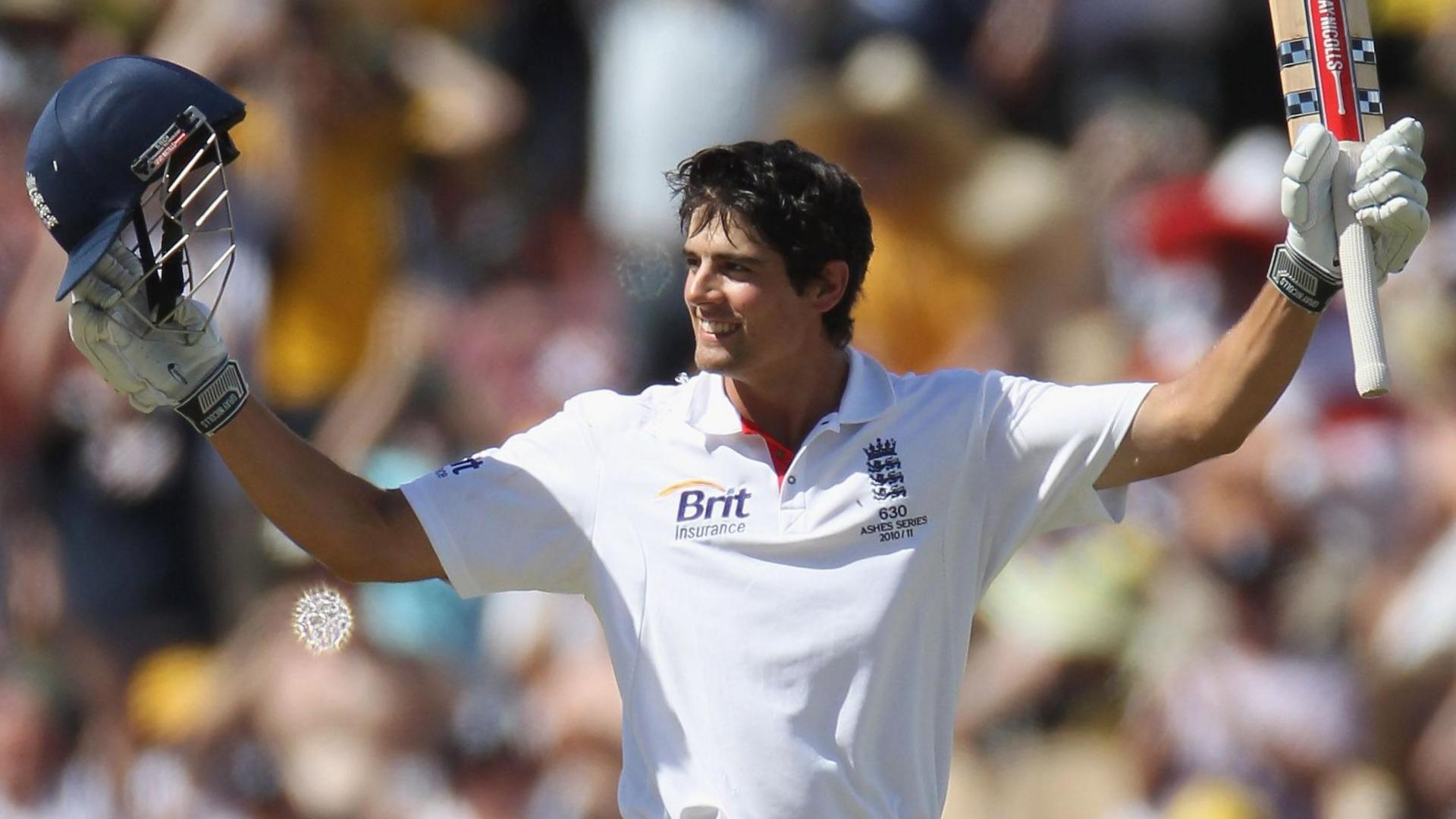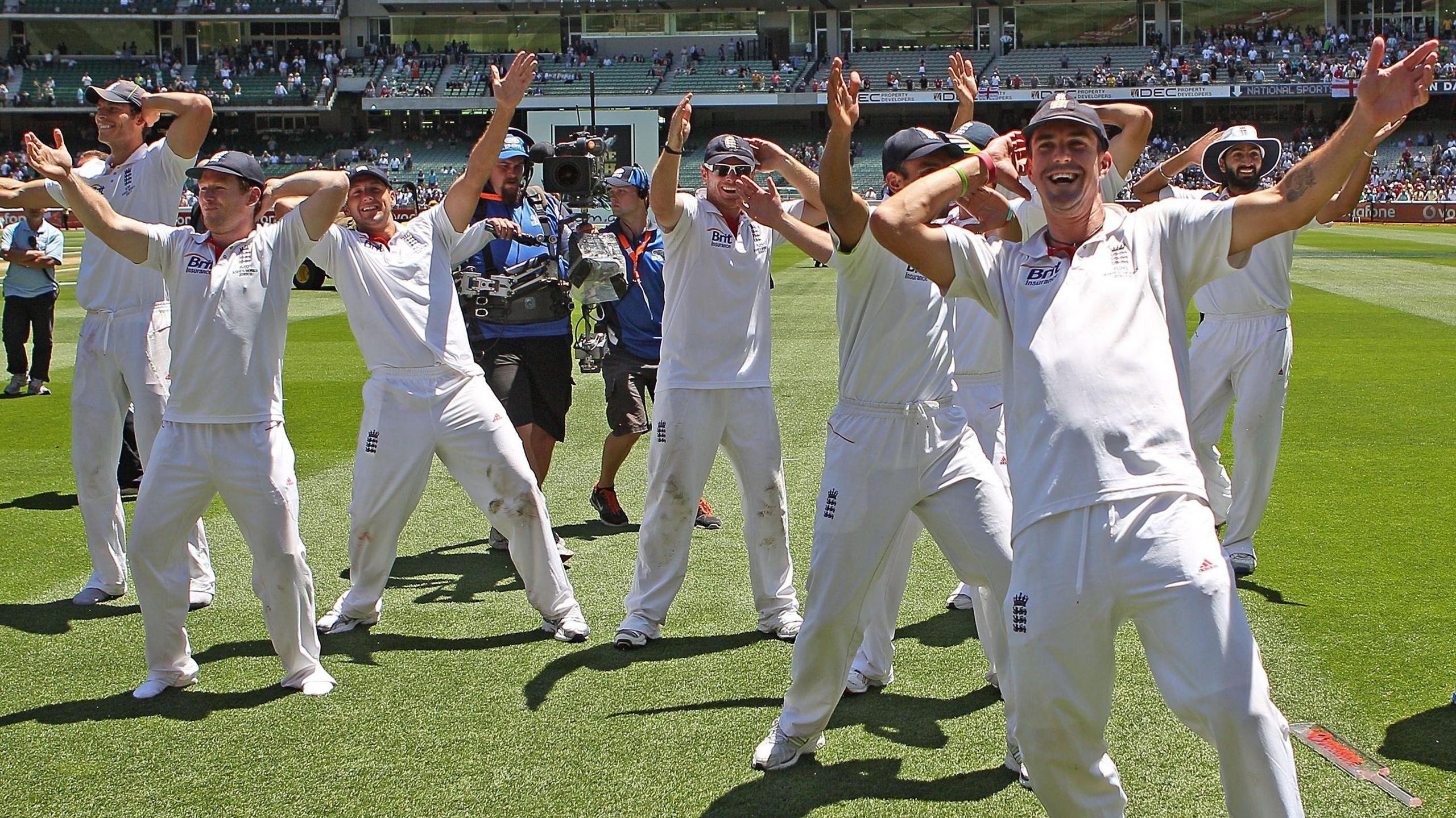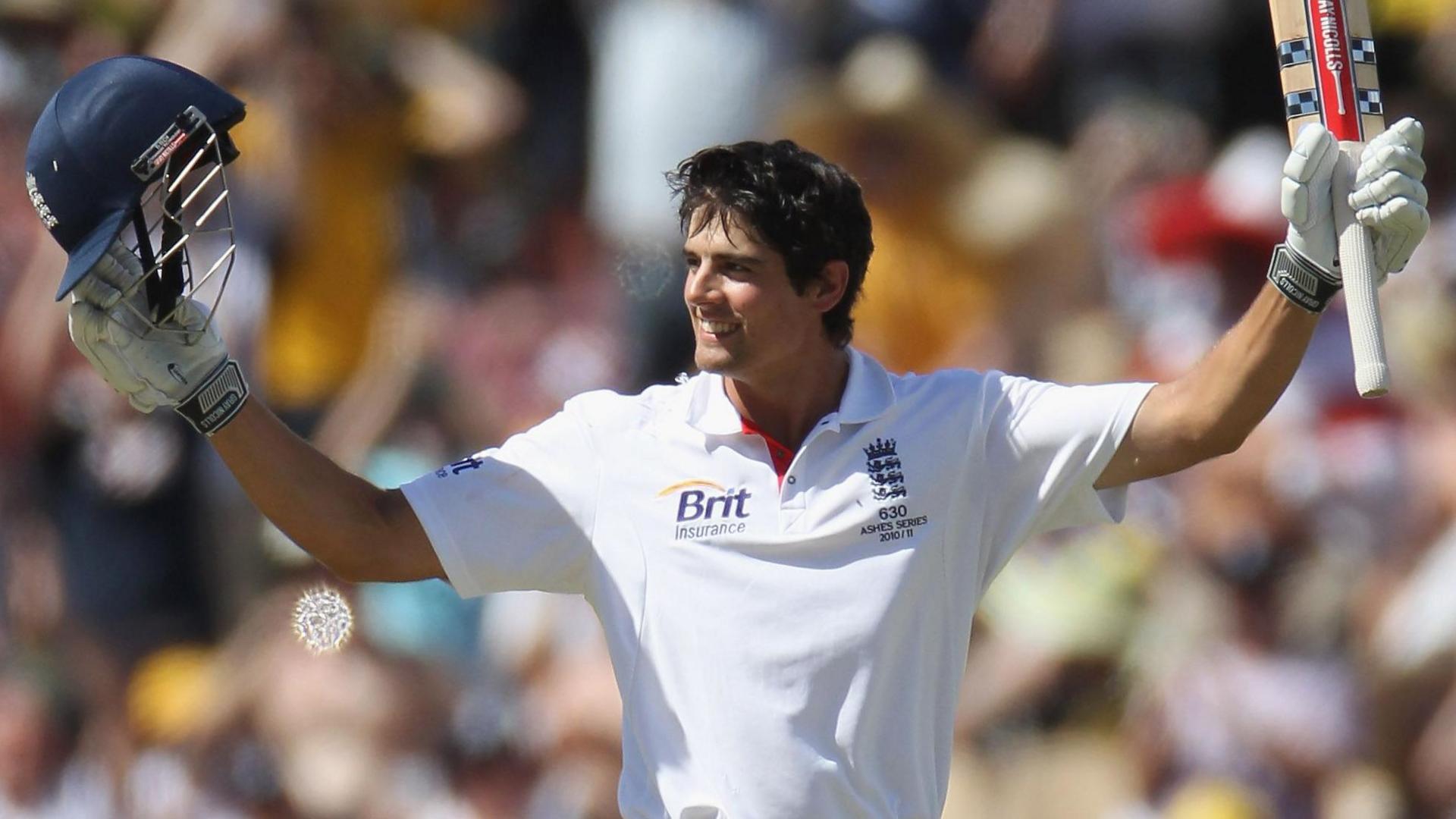
-
-
14 Comments
Brisbane is not a city to give England some much-needed Ashes optimism.
After defeat by Australia in the first Test, the tourists must stir themselves for a trip to the Gabba, a ground where England have not won since 1986.
Men wearing three lions have habitually been lambs to the slaughter at the Gabbatoir.
Among a recent history of broken English hopes, dreams and bodies is a source of inspiration delivered by a shining knight.
It is exactly 15 years since Sir Alastair Cook conquered the Gabba with a career-defining 235 not out, saving the first Test of 2010-11 and setting England on course to their only Ashes series win in Australia in the past 38 years.
It was the beginning of Cook’s triumphant circumnavigation of Australia; three hundreds and 766 runs. Wally Hammond is the only Englishman to score more runs in a series in this country.
England won 3-1, with all victories by an innings. They have not won a Test here since.
«You forget the tough times, the nervousness and anxiety that went into that,» Cook tells the Test Match Special podcast.
«I look back with pride. I played a significant part in a series when England won 3-1 in Australia and all three games were won by an innings. That just doesn’t happen. One day, I need to sit down and watch some of it.»
Cook’s road to his Australian epic began 18 months earlier, at the end of the 2009 Ashes in the UK. England won, but the opener averaged less than 25 with just one score above 50.
He wanted more.
«Cricket is a team game, but the individuality does make you feel like you want to pull your weight,» he says. «The stats are very clear. I wanted to be part of an Ashes series I did well in, then it would have meant more.
«I wanted to judge myself against the best and my game wasn’t stacking up against the best bowlers in the world.
«Two days after the celebrations I was back hitting hundreds and hundreds of balls in the nets with Graham Gooch, trying to groove something very unnatural, thinking in the long run it would be better for my technique.»
The initial results were encouraging. Cook made three hundreds on the 2009-10 winter tours to South Africa and Bangladesh.
When Cook returned to England for the 2010 summer, the left-hander had a «stinker». In eight innings against Bangladesh and Pakistan, his highest score was 29.
-
Listen to the Test Match Special podcast: Alastair Cook on the 2010-11 Ashes win
On nought not out at the end of the second day of the third Test against Pakistan at The Oval, Cook was convinced he was playing his last Test innings before being dropped.
«I was sitting in the bar, trying to find the answer in the bottom of a beer bottle,» he says.
«I made the promise to myself: ‘Don’t get out defending tomorrow’. That was where I was at.
«It was a clearing of the mind. I decided to go back to my old technique. I attacked and had 76 by lunch on the third day.»
Cook’s 110 guaranteed his seat on the plane to Australia, albeit via an infamous team-bonding trip to Bavaria dreamt up by England coach Andy Flower and captain Andrew Strauss.
Players carried bricks uphill and did hundreds of press-ups. James Anderson suffered a cracked rib in a boxing session. Luckily for Cook, he missed almost all of it.
«I was at my brother’s wedding,» he says. «I turned up for the last day. The most broken men were Strauss and Flower. I thought it served them right because they organised the thing.
«I’m genuinely disappointed I did miss it. For the next little while there were always references back to that camp. At the time it was horrendous, but the fact we were still talking about it years later shows it had its worth. I think people really opened up around the camp fire every night.»
Well-drilled on and off the pitch, England continued their preparations by winning two and drawing one of their warm-up games in Australia – Cook scored a century against South Australia at the Adelaide Oval.
Come the first Test at the Gabba, they were hit by Peter Siddle’s hat-trick, then hundreds from Mike Hussey and Brad Haddin.
An hour before the end of the third day, Cook and Strauss opened England’s second innings with a deficit of 221 runs. They reached 19-0 at stumps and followed up with a performance etched in Ashes folklore.
«I don’t remember the messages, anything of what we spoke about,» says Cook. «We had an experienced team and the pitch had no demons. We just had to show some fight.»
The left-handers added 188 for the first wicket. Strauss made 110. When the captain fell, Jonathan Trott eased into Cook’s slipstream for an unbeaten 135.
Cook’s 235 not out was the highest score by an Englishman in Australia for 82 years, beaten by his own 244 not out in Melbourne seven years later. England racked up 517-1 to save the Test and put Australia on the back foot.

«It was my 14th Test hundred, but the first time when it felt like I had really contributed and made a difference,» says Cook.
«It gave us a lot of belief the Australian team were there for the taking. We got out of jail, but in a way that gave us a lot of confidence.»
England capitalised on an astonishing first morning of the second Test in Adelaide. Simon Katich was run out by Trott’s direct hit from the fourth ball of the match and Australia captain Ricky Ponting was out first ball to Anderson.
When Anderson also nicked off Michael Clarke, Australia were 2-3 and never recovered. The home side spiralled to 245 all out, leaving England one over to bat at the end of the first day.
«We got into the changing room and Flower asked if we were having a nightwatchman,» says Cook.
«If Jimmy Anderson opened the batting, got out, then I went out to bat, imagine the stick I’d have got from the Australians when they were pumped up.
«Straussy usually took the first ball, but I said to him ‘I’m going out there now and will face the first ball. You do what you want’.
«He said ‘OK. I’ll do it as well’.»
Cook followed up his Brisbane heroics with 148 in a Test remembered for Kevin Pietersen dismantling the Australian attack in his 227. Off-spinner Graeme Swann took five wickets in the second innings to bowl England to victory just before the heavens opened on the fifth day.
«After struggling the whole last summer, I was hungry for runs, and there’s no better place to be hungry than a flat Adelaide pitch in 40-degree heat,» says Cook.
«The KP double hundred was a real marker of dominance, of taking Australia down. He led it, the team got ahead of the game. He hammered Australia into the ground.»
England could have retained the Ashes in Perth, only for Mitchell Johnson to foreshadow the havoc he would cause four years later.
England bowled out Australia for 268 and reached 78-0 in reply before Johnson got going. The left-armer took nine wickets in the match and England lost by 267 runs.
«We had a team meeting straight after and I wasn’t sure it was the right thing to do,» says Cook.
«It turned out to be the right move. Flower wanted us to look at how we lost the game.
«Did we take our eyes off what we were doing and started to think about the end result? Did we think we had done all the hard work and were going to win? Maybe we were thinking about retaining the Ashes there in Perth. I don’t know.
«There were questions we maybe didn’t have the answer to, but it was important to get them out. We went to Melbourne and the Perth game was buried. It was 1-1 and it became a two-match series.
«Australia were flying, there were pictures of Ricky Ponting all over the newspapers, people were saying we were done.»

What followed was perhaps England’s single greatest day of Ashes cricket in Australia.
At the Melbourne Cricket Ground, the 100,000-seater cathedral of Australian sport, and on Boxing Day, the highlight of the calendar in this country, the home side were blown away for 98. England – Cook and Strauss – were 157-0 at the close.
«If Carlsberg did Boxing Days, it was that. There was disbelief at the end of the day,» says Cook. «Me and Strauss cleared the MCG with our batting – most people wanted to go home when we were batting together.
«The Aussies are very proud of how many people they can get to the MCG on Boxing Day. By the end there were only 20,000 English people watching me and Strauss grind it around Melbourne.
«If I could go back through my career and play any one day over again, that would be right up there because of what we did as a group.»
Trott made 168 and England won by an innings and 157 runs. They celebrated retaining the Ashes with a sprinkler dance on the MCG outfield.
«I felt a little bit uneasy doing it, because we hadn’t gone there to retain the Ashes – we’d gone there to win,» says Cook.
«I enjoyed the dressing room in Melbourne and a few of the lads went out and enjoyed a night with the Barmy Army, but we hadn’t finished yet.
«A result of 2-2 would have felt a bit of an injustice. However good Melbourne was, we still had Sydney.»
Fuelled by the focus to win the urn, Cook was at it again at the Sydney Cricket Ground. His 189 lifted England to 644, their highest total in a Test in Australia.
The question was not if England would win the match and the Ashes, but when.
«The fourth evening, Chris Tremlett bounced out Brad Haddin and brought Mitchell Johnson to the wicket,» says Cook.
«The song the Barmy Army sang, I’ve never heard anything like it. I spoke to Tremmers and he said ‘I’m just going to bowl this as fast as I can’. He bowled an absolute jaffa to Johnson, and it bowled him. I’ve never heard noise like it.»
England took the extra half an hour on that fourth evening, but could not get over the line.
The fifth morning was a victory procession. The Barmy Army and the rest of the travelling supporters were joined in the SCG by every ex-pat and backpacker in Sydney for an English Ashes party.
«The atmosphere was incredible,» says Cook. «It felt like an age, I was desperate to take the final wicket.
«When Tremlett got Michael Beer out to win the match, it was a moment of pure elation, just incredible.
«It was so early in the day, we had so much time to soak it in. I don’t know when we left the ground, but we stayed for absolutely ages, on the outfield and in the changing rooms. It was very, very special.»
Cook was player of the series. The remaining seven years of his Test career were illuminated by other milestones: a starring performance in the 2012 series win in India, winning the Ashes as captain in 2015 and breaking the England records for most Test runs and hundreds.
There were low moments, too, most notably the humiliating 5-0 defeat in Australia when he was captain in 2013-14.
Following his international retirement in 2018, Cook was knighted for services to cricket. That service was best delivered on the 2010-11 tour of Australia.
«I couldn’t have played any better,» he says. «I was very lucky to have been part of that team, achieving something rare for England in Australia.
«When you win games of cricket, it is unbelievably special. It was hard work, but international sport is hard work.
«It was such a good team to be part of. Flower and Strauss were tough, and that regime was very regimented, but we had the time of our lives there.»
Related topics
- England Men’s Cricket Team
- Essex
- The Ashes
- Cricket
-
Get cricket news sent straight to your phone
-
16 August

-














